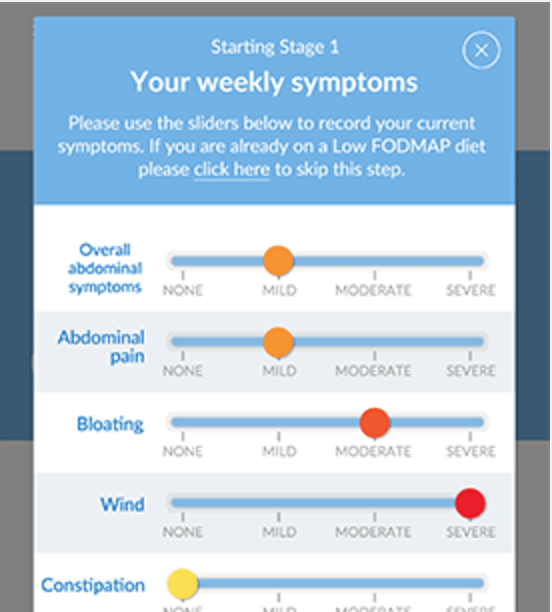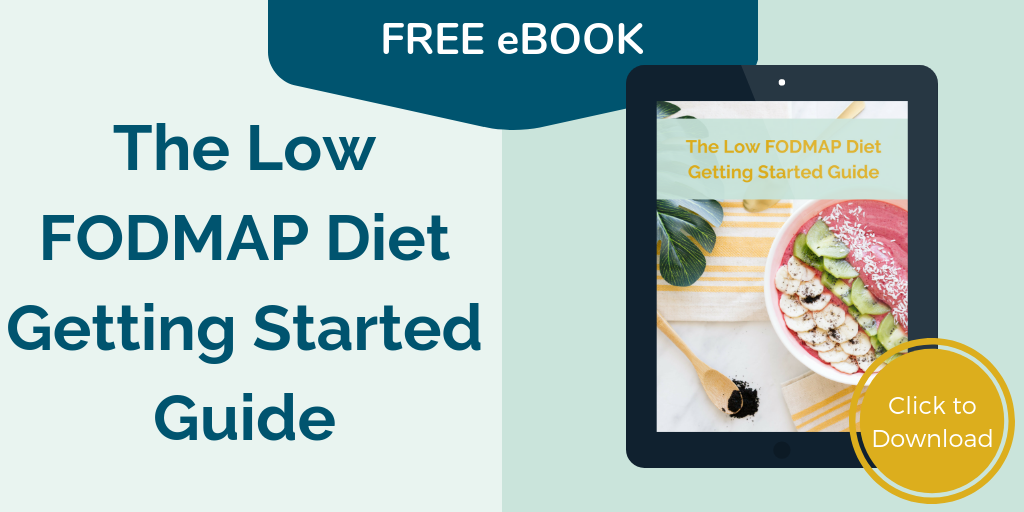Low FODMAP Diet & Digestive Health News
With the public’s growing concern for eating healthy and more awareness about Irritable Bowel Syndrome (IBS), we are seeing a greater focus on digestive health. Amidst the publishing of new research and the release of new products targeted at improving digestive health, it can be difficult to keep up-to-date. Here are this week’s highlights.
MEDIA UPDATES
Low FODMAP Diet Decreases Symptoms of IBS
The health website, Examine, recently wrote a piece about the Low FODMAP diet. It gives a great overview of the diet and the current literature to support it. Overall, it states that the low FODMAP diet is the most effective way of managing IBS and should be the first line of treatment for the condition. They also answer several frequently asked questions about the Low FODMAP diet – a great read for anyone who is newly diagnosed!
Wondering what else affects symptoms of IBS like gas, bloating, abdominal pain, diarrhea or constipation? You’ve got to understand more about the FODMAPs, poorly digested sugars that are the most common triggers in digestive issues. Download my free eBook – Click here to get a copy emailed to you right away.
Digestive Health: Eating for Healthy Gut Bacteria
With an increased awareness of the importance of the gut microbiome, more people are interested in improving their gut health.
Some recommendations include:
Eating a diet high in fibre: Fibre is important for our gut health. It’s a source of food for the good bacteria in your gut.
Consuming whole grains: Consuming whole grains has been shown to reduce your risk of chronic health conditions. Many people on the Low FODMAP diet may be tempted to restrict their grain consumption because of symptoms, but there are lots of tasty, whole grain options that are low in FODMAPs, including amaranth, corn, buckwheat, and oats.
Gut Bacteria and Eating Habits
The news website, The Conversation, created a great summary of why it’s important to include fibre rich foods in your diet. Understanding why it’s important to include fibre in your diet, especially when following a Low FODMAP diet, may encourage you to become more aware of your fibre consumption.
The bacteria in our gut is influenced by a number of factors including where we live, our genetic make-up, and medications we might be taking. One factor is under our control: our diet. What we eat can influence the number and type of bacteria in our gut. A key function of the bacteria in our gut is to break down carbohydrates. The products created from this process are important for our health, such as decreasing your risk of heart disease. A diet high in fibre is associated with a healthier gut because it promotes a diverse pool of good bacteria. For this reason, although it can be tricky to determine how much fibre your body can tolerate, it’s important to try to consume as much as possible.
Crohn’s and Colitis Advocacy: Improving Washroom Access
Crohn’s and Colitis Canada are advocating for increased access to washroom facilities in government buildings. They argue that flare-ups can cause emergency situations where having access to a washroom is key. Crohn’s, like IBS, can be a very isolating condition. Feeling supported by gaining access to a clean and safe place is critical for improving quality of life. Increasing access to washrooms will also improve the lives of people living with IBS who share in the struggle of finding suitable facilities during flare-ups. If you are interested in signing the petition or reading more about this initiative, click here: The Issue: Washroom Access.
There are several mobile applications on the market that can assist you in finding a public bathroom. To find the best one for you, click here: 5 Apps to Help You Find a Bathroom.
Crohn’s Disease and the Low FODMAP Diet
Based on Healio’s Top 10 most read articles for 2016, the Low FODMAP diet and new drug treatments for Crohn’s disease were at the top of the list. Another highlight related to digestive health includes the release of the ROME IV criteria used to diagnose disorders such as IBS.
FODMAP Diet the First Line of Defence for Those with IBS
The scientific magazine, Knowridge, recently released a piece about the University of Michigan study on the Low FODMAP diet. The study adds to the already large body of evidence supporting the use of the Low FODMAP diet as the first line of treatment for those living with IBS. It also stresses the importance of working with a health professional, such as a registered dietitian familiar who is familiar with IBS and the Low FODMAP diet. One of the researchers involved in the study warned “that the list of foods [to restrict is] exhaustive and elusive, and the help of a dietitian is recommended”. It is important to consider the context of research studies on the Low FODMAP diet; that is, they are often only focusing in on one specific window of time while isolating single variables. We believe combining general strategies to improve digestive health along with the Low FODMAP diet is the most effective way to help those suffering with IBS; even more so than implementing the Low FODMAP diet alone.
PRODUCT AND SERVICE UPDATES
Bowelle: The IBS Tracker
Bowelle allows users to track IBS symptoms on their iPhones. Over time, the application creates a record of your symptoms that can be displayed in chart form. You can track your stress levels, bowel movements, and food and water intake. It’s a convenient way to keep track of symptoms and help you recognize trends over time. It calculates daily averages of each category to help to visualize how your symptoms have improved or changed. The app allows you to view biweekly or monthly averages to get a sense of changes over a longer period of time. You can also conveniently share your data with your doctor or dietitian via email. The interface for the app is simple and seems user friendly, making it a helpful tool for those of us trying to figure out our trigger foods and monitor progress over time – very exciting news for anyone looking for an easy way to keep track of their IBS symptoms!
Food Maestro: FODMAP Product Scanner

Taken from: Food Maestro
Determining your dietary triggers is one of the trickiest parts of following the Low FODMAP diet. The Food Maestro FODMAP app aims to make the process a bit easier by enabling users to quickly scan barcodes of products for potential FODMAPs. Developed by researchers and dietitians from King’s College in the UK, the app allows users to customize features based on which stage of the Low FODMAP diet they are in (i.e. elimination or re-introduction). It also gives guidance on appropriate serving sizes depending on the stage of the diet you are in. Eventually, you will reach the “personalization stage” where you have a customized list of foods you can tolerate. It also includes a symptom tracker that asks you to rate your symptoms on a scale from “none” to “severe”. As an additional feature, you can create personalized shopping lists that you can share with others. The Food Maestro FODMAP app was designed to be used in consultation with a dietitian or other healthcare professional. At the moment, the app is only available in the UK.
IBS Food Scan: FODMAP Product Scanner
Another mobile application developed to help you pinpoint trigger foods is IBS Food Scan. IBS Food Scan is an app developed to scan the ingredient list of food products and check for FODMAPs. The app allows you to customize settings based on your specific food sensitivities. Once you have scanned a product, you can create a list of FODMAP friendly foods that you can then share with family and friends.
Stool Log Lite: Keep Track of Symptoms
Stool Log Lite is an application developed by the company digitalsirup GmbH. It allows users to track changes in their bowel movements in a simple journal. You can classify your stool based on the Bristol Stool Chart and include your own notes to help you determine what may have caused any changes in your symptoms. The app will calculate statistics for you so you can see patterns or changes that emerge over time. If you would like to share your data with your dietitian or doctor, the app allows you to send all information collected as a plain text file.
Written by Adi Hazlewood, News and Culture Editor
References
- Bowelle. 2016. The IBS Tracker.
- Food Maestro. 2016. FODMAP by FM.
- App Advice.2016. IBS Scan.
- digitalsirup GmbH. 2016. Stool Log Lite.
- Examine. 2016. Cute out FODMAPs, cut out IBS.
- Natural Products Insider. 2016. Digestive Health: Balancing the Gut Microbiota.
- The Conversation. 2016. Fat or thin: can the bacteria in our gut affect our eating habits and weight?
- Crohn’s and Colitis Canada. 2016. The Issue: Washroom Access.
- Knowridge. 2016. Low FODMAP diet improves health in people with irritable bowel syndrome.
- Healio. 2016. New Crohn’s treatments, low FODMAP diet among top gastroenterology topics in 2016


